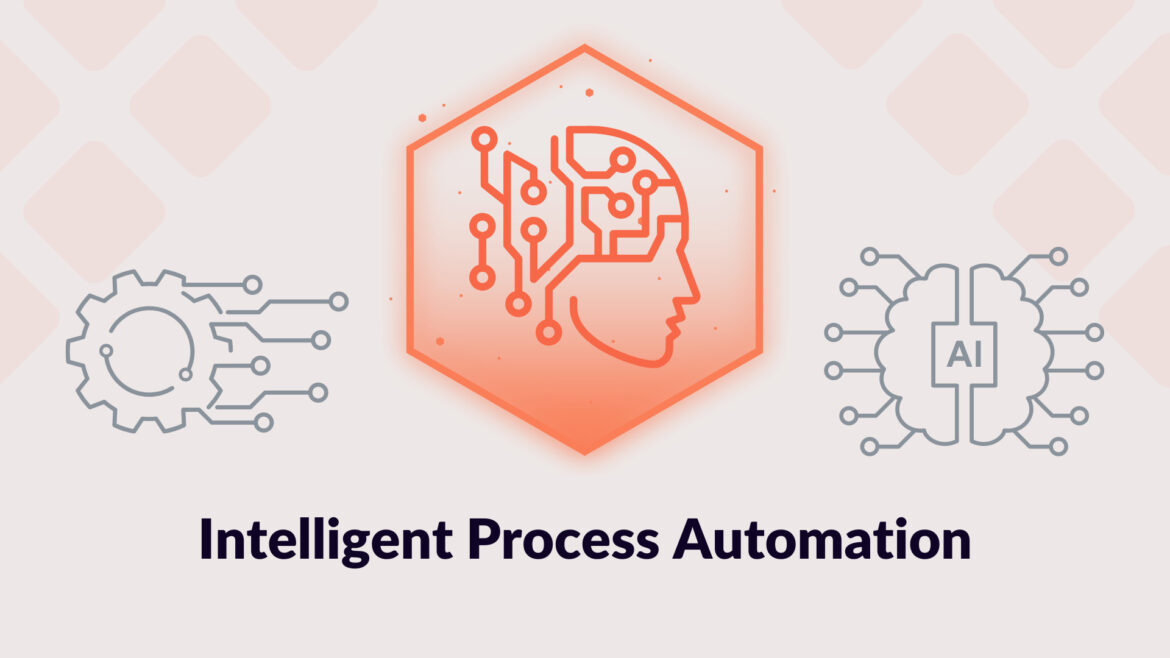One of the most promising digital transformation areas, Intelligent Process Automation (IPA), has emerged as highly valuable across various sectors. IPA is gaining widespread recognition for its power to streamline operations, boost efficiency, and drive innovation. Notably, a survey by McKinsey & Co. reveals that 66% of businesses have automated at least one business process, showcasing the increasing adoption of IPA in the corporate world. Additionally, a Kissflow survey found that around 80% of businesses are accelerating process automation, and 50% aim to automate all repetitive tasks. These statistics provide a clear indication of the rapidly growing significance of IPA. As we delve into 10 real-world examples of IPA implementation, we’ll illustrate how this technology is shaping the future of businesses across the globe.
Defining Intelligent Process Automation (IPA)
Intelligent Process Automation (IPA) combines artificial intelligence (AI) and automation. It’s designed to mimic human decision-making, learn from experiences, adapt to new situations, and perform tasks faster and more accurately than a human could.
The beauty of IPA lies in its versatility and power. It can automate routine tasks, freeing time for employees to focus on more complex and rewarding activities. But IPA goes beyond simple automation. With the ability to learn and adapt, IPA systems can handle exceptions, make decisions, and even improve their performance over time.
The potential impact of IPA is vast. Gartner, a consultancy, estimates that about 69% of all managerial work will be entirely automated by 2024, signifying a significant shift in businesses’ operations. This progression is not about replacing humans; it’s about augmenting human capabilities, increasing productivity, and driving innovation.
Through the following real-world cases, we will illustrate the transformative power of IPA across various sectors and its role as a catalyst for business evolution.
Your Path to Innovation Starts with Digital Transformation
Customized Digital Strategies for Competitive Advantage
Explore Digital Transformation10 Real-world Cases of Intelligent Process Automation
Case 1: Healthcare
Intelligent Process Automation (IPA) has significant applications in the healthcare industry. Its versatility ranges from enhancing disease management to revolutionizing personalized medicine. A prime example of this is in the development of mobile applications like Autismate, designed to support individuals with autism. The application’s evolution from a simple tool into an integrated aid system showcases the adaptability and potential of IPA. In such scenarios, IPA works behind the scenes to analyze user data, deliver tailored responses, and provide meaningful support, underlining its value in augmenting human capability and managing complex tasks in healthcare.
One other compelling illustration is the utilization of IPA in radiology. AI-driven tools have been developed to analyze radiological images, improving diagnostic accuracy and reducing the radiologists’ workload. This application of IPA makes the diagnosis process more efficient and aids in the early detection of conditions, potentially saving lives.
Another impactful example is drug discovery. By employing IPA, pharmaceutical companies can automate the process of analyzing vast amounts of data related to drug interactions and effects. This significantly reduces the time taken to develop new drugs and brings lifesaving medications to the market faster.
Accelerate Your Growth with Mobile Application Development
Creating Mobile Apps that Bring Your Business Closer to Your Clients
Explore Mobile App DevelopmentCase 2: Manufacturing
Manufacturing is a sector where Intelligent Process Automation (IPA) shines, particularly in the realm of predictive maintenance. This application of IPA anticipates machine failures, thereby avoiding unscheduled downtimes and increasing machine lifespan. A recent McKinsey study shows that predictive maintenance can reduce machine downtime by 30-50% and extend machine life by 20-40%. By leveraging IPA, industries can significantly enhance operational efficiency and equipment longevity, driving the future of sustainable manufacturing.
Case 3: Finance
The finance sector is reaping substantial benefits from Intelligent Process Automation (IPA). For instance, by implementing IPA, a global bank significantly reduced the time it took to open an account, from 20 minutes to just 5. Similarly, a financial services firm automated its invoice processing with IPA and reduced processing time by 80%. And a global insurance company applied IPA to its claims processing, halving the processing time.
These examples underscore the transformative impact of IPA, streamlining operations, reducing errors, and redefining service delivery. A fitting example of this is the Tinka application, developed by HyperSense, which simplifies the process of consumer credits, demonstrating how IPA can make financial services more accessible and efficient.
Case 4: Sales and Marketing
Intelligent Process Automation (IPA) is revolutionizing sales and marketing. Automating repetitive tasks, boosts productivity, reduces costs, and enhances efficiency. Let’s look at some compelling examples:
- Salesforce’s cloud-based CRM uses IPA, specifically its Einstein AI platform, to automate sales processes. Einstein AI analyzes customer data and generates insights to expedite deal closures. Companies utilizing Einstein AI have witnessed a 26% increase in win rates, underscoring the potent influence of IPA in sales.
- McKinsey & Company leverages IPA in marketing. Their platform utilizes machine learning algorithms to analyze customer data, providing insights that allow marketers to devise more effective campaigns. Consequently, companies that integrate IPA into their marketing strategies report a 10-20% rise in revenue, marking a significant impact of automation on marketing outcomes.
These cases depict how IPA reshapes the sales and marketing landscape, fuel efficiency, and drives growth.
Case 5: Human Resources
Intelligent Process Automation (IPA) is creating ripples in Human Resources (HR), bringing in a new era of efficiency and precision. From talent acquisition to employee onboarding and performance management, IPA is proving to be an invaluable asset.
For example, by automating the recruitment process, businesses can quickly sift through large volumes of resumes, identify the most suitable candidates, and streamline interview scheduling. This reduces the hiring time and ensures a fair, unbiased selection process.
Regarding performance management, IPA can automate data collection, collate feedback, and generate insightful reports, making the review process more objective and comprehensive. Moreover, automated onboarding helps new hires settle in quickly, ensuring they have the necessary resources and information right from the start.
Integrating IPA in HR functions is paving the way for a more efficient, accurate, and fair HR landscape.
Case 6: Supply Chain Management
Intelligent Process Automation (IPA) significantly optimizes supply chain management, providing enhanced operational insights and cost reductions.
Boston Consulting Group leverages IPA in supply chain processes. Its IPA platform uses machine learning to analyze supply chain data, offering critical insights for optimization. According to BCG, companies utilizing IPA in supply chain management witness a 10-20% reduction in costs, highlighting the cost-effectiveness of automation.
Similarly, TaylorMade Golf, a renowned golf equipment company, has automated its supply chain processes using IPA. This approach provides them with a comprehensive analysis of supply chain data, optimizing their operations. The result? A 30% reduction in inventory levels post-IPA implementation demonstrates IPA’s role in enhancing efficiency and streamlining inventory management.
Case 7: Customer Service
Intelligent Process Automation (IPA) improves customer service by automating routine tasks, allowing service representatives to focus on complex, value-added interactions.
For instance, many businesses now use IPA to automate responses to frequently asked questions, significantly reducing response times. This not only improves customer satisfaction but also increases the productivity of service reps, allowing them to handle a higher volume of requests efficiently.
Additionally, IPA facilitates using AI-powered chatbots for 24/7 customer support, delivering instant responses to customer queries. This leads to increased customer engagement, better service delivery, and improved customer loyalty.
Case 8: Software Development and Consultancy
Intelligent Process Automation (IPA) is gaining terrain in software development and consultancy, enabling faster and more efficient project delivery.
One example is the automation of code review. With IPA, companies can automate the process of scanning code for errors or inefficiencies, thereby ensuring high-quality code while saving time for developers. For instance, Amazon has reported that their automated code review tool, CodeGuru, has helped developers reduce the time spent on code reviews by up to 50%.
Another area is the automation of project management tasks, such as task allocation and progress tracking. This not only improves the efficiency of project managers but also enables a more transparent and productive work environment. Atlassian’s JIRA, a project management tool for software development teams, for instance, employs IPA to automate
Redefine Your Business with Custom Software Development
Tailored Software Solutions Designed for Your Growth
Explore Custom SoftwareCase 9: Education
In the Education sector, Intelligent Process Automation (IPA) is changing how we teach and learn. For example, institutions can use IPA to automate administrative tasks such as attendance tracking and report generation, thereby enabling educators to focus more on teaching.
Moreover, adaptive learning platforms use IPA to analyze students’ learning patterns and provide customized educational content, enhancing the learning experience. Companies like Knewton provide such platforms, and they’ve seen significant improvements in student performance.
Case 10: Cybersecurity
In Cybersecurity, IPA is essential in automating threat detection and response. Cybersecurity platforms like Darktrace employ machine learning algorithms to analyze network traffic and detect anomalous behavior indicative of a cyber threat.
Once a threat is detected, IPA can automate the response, such as isolating the affected system or blocking the source of the attack, thereby minimizing damage. In this way, IPA is a powerful tool in enhancing an organization’s cybersecurity posture.
Intelligent Process Automation (IPA) is a game-changer across various industries. Whether it’s enhancing patient care in healthcare, increasing efficiency in manufacturing, or optimizing customer service, IPA is driving significant improvements in productivity, accuracy, and cost-effectiveness. Its adaptability to diverse applications makes it an indispensable tool in the modern business landscape.
Redefine Your IT Strategy with Our Consultancy
Customized Solutions for Optimal Performance
Discover IT ConsultingIf you want to leverage the power of Intelligent Process Automation in your business, HyperSense can help. As a leading software consultancy and development company, we specialize in developing bespoke automation solutions tailored to your specific needs. Our team of experts is ready to guide you on your automation journey, helping you unlock new efficiencies and drive business growth. Don’t wait for the future of business; start shaping it today with HyperSense.










